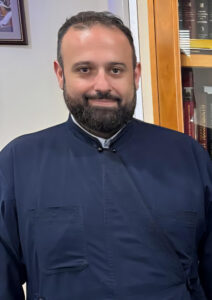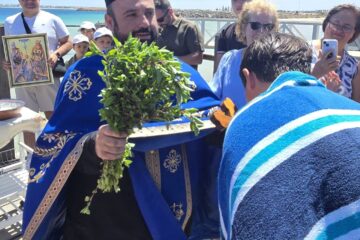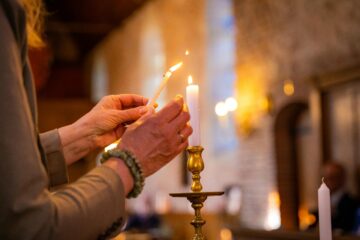By Fr. Michael Psaromatis
Greek Orthodox Archdiocese of Australia
A Christian is not one who tallies achievements, but one who abides in Jesus Christ in whom the Father gives the Spirit (John 17:3; Galatians 2:20).
Christianity is not self-improvement by tally. It is communion with a Person, Jesus Christ, through whom the Father gives the Spirit (John 17:3; Galatians 2:20). This is eternal life, not a chart of merits but a knowing: “that we may know the Father and the Son whom He has sent” (John 17:3). The Lord speaks in personal terms: “Behold, I stand at the door and knock. I will come into the one who opens and dine with him, and he with Me” (Revelation 3:20). This is the heart of it.
Into this light the Gospel places the rich young ruler. “Teacher, what good deed must I do to have eternal life?” (Matthew 19:16). He has kept the commandments from youth. Christ recalls the neighbour facing commands first, then leads him beyond them to the heart. “If you would be perfect, go, sell what you possess and give to the poor, and come, follow Me” (Matthew 19:21). Perfection, τέλειος (teleios), is maturity in love rather than flawlessness. “Follow Me,” ἀκολούθει μοι (akolouthei moi), names a relationship, not a regimen. The scene ends with the camel and the needle to show that grace, not human bookkeeping, opens the Kingdom (Matthew 19:24 to 26). Saint John Chrysostom notes that the young man lacked the crowning thing, love unbound from earthly ties, so the Lord draws him from what can be counted to what must be consecrated (Saint John Chrysostom, Homilies on Matthew 63). Not counted but consecrated.
This scene is a mirror held up to our habits, East and West. Much Western pastoral culture, shaped by medieval juridical frames and later by concerns for assurance, often searched for confidence in external marks. In one stream, sin was treated as debt and salvation as satisfaction, with penance and observances drifting into a ledger. In another stream, the Reformers’ right insistence on grace and faith sometimes devolved in practice into a new checklist of proofs that one is truly saved, a once for all profession, scrupulous habits, visible zeal. Saint Paul permits neither pride nor despair to rest on such ground: “By works of the law no human being will be justified in His sight” (Romans 3:20). Nor does he abolish obedience. He relocates it within mercy: “Not by works of righteousness which we have done, but according to His mercy He saved us, by the washing of regeneration and renewal of the Holy Spirit” (Titus 3:5). Augustine says it with balance and light: “The Law was given that grace might be sought, and grace was given that the Law might be fulfilled” (Saint Augustine, On the Spirit and the Letter 19). Aquinas adds that charity is the form of every virtue, so the commandments are fulfilled as love rather than technique (Saint Thomas Aquinas, Summa Theologiae II to II, q.23). Luther insists that faith alone justifies, yet living faith is never alone but “works through love” (Martin Luther, The Freedom of a Christian). Calvin points to the Spirit’s inward witness, though later pastoral cultures often sought outward marks of election (John Calvin, Institutes of the Christian Religion III.2). These lines are not judgments of Catholic or Protestant hearts. They name tendencies. Wherever charity truly forms life, theosis is already at work by grace (1 Corinthians 13:1 to 3). Love, not tally.
Orthodoxy answers from a different centre. Salvation is communion with the living God, what the Fathers call theosis, our participation in His life by grace. “God became man so that man might become god,” writes Saint Athanasius (Saint Athanasius, On the Incarnation 54). Saint Gregory Palamas teaches that we are united to God through His uncreated energies, becoming by grace what He is by nature (Saint Gregory Palamas, Triads III.1). Saint Maximos the Confessor shows that as the passions are healed, the commandments are kept from within rather than imposed from without (Saint Maximos, Chapters on Love). In simpler words, theosis unfolds through synergy, our free cooperation with the Spirit who works in us what we cannot work for ourselves (Philippians 2:12 to 13). Scripture sings the same mystery in many voices: “It is no longer I who live, but Christ who lives in me” (Galatians 2:20). We become “partakers of the divine nature” (2 Peter 1:4). With unveiled face we are “being transformed into the same image from glory to glory” (2 Corinthians 3:18). “Abide in Me, and I in you, for without Me you can do nothing” (John 15:4 to 5).
The prophets and the Lord Himself unmask a religion of surfaces. “I will give you a new heart and a new spirit I will put within you. I will put My Spirit within you” (Ezekiel 36:26 to 27; Jeremiah 31:33). “This people honours Me with their lips, but their heart is far from Me” (Matthew 15:8). “The Kingdom of God is not eating and drinking, but righteousness and peace and joy in the Holy Spirit” (Romans 14:17). Isaiah gives the fast that God chooses: loosen injustice, share bread with the hungry, shelter the poor (Isaiah 58). Micah gathers the whole law into three movements that admit no ledger: do justice, love mercy, walk humbly with your God (Micah 6:6 to 8). Saint James refuses to split faith from life, not to erect a new list, but because living trust takes flesh: “I will show you my faith by my works” (James 2:18). “If I give away all and even surrender my body, but lack love, I gain nothing” (1 Corinthians 13:1 to 3). Love, not tally.
From this centre Orthodox practice becomes a school of communion. Prayer is conversation with God in secret, where the Father sees and answers (Matthew 6:6). Fasting trains desire to hunger for the Bread of Life and to love mercy more than appetite (Matthew 6:17 to 18; Isaiah 58). Almsgiving recognises Christ in the poor and meets Him with open hands (Matthew 25:40). Confession is not tally and penalty, but the meeting of our poverty with the Father’s compassion, a homecoming of the heart (Luke 15:17 to 24; Psalm 51:17). The Divine Liturgy is not an event to attend. It is our entrance into the self-offering of the Son to the Father in the Holy Spirit. Here the Church teaches us how to live. “Let us commit ourselves and one another and our whole life to Christ our God.” “Thine own of Thine own we offer to Thee, in all and for all.” As we give thanks to the Father who brought us from non-existence into being, the Eucharist writes the grammar of communion in us (Divine Liturgy of Saint Basil). As Archbishop Makarios of Australia has put it, “Dogma must be transformed into doxology, and truth must be fulfilled in love” (Archbishop Makarios of Australia, keynote address “Nicaea at 1700: A Council for the Ages?”, Sydney, 22 August 2025). Saint Nicholas Cabasilas says that we do not live the life in Christ by imitation from afar, but by being ingrafted into Him through the Mysteries, above all in the Eucharist where Christ lives in us and we live in Him (Saint Nicholas Cabasilas, The Life in Christ). Saint Basil warns that to abstain from meat while devouring a brother with slander is to misunderstand fasting entirely. The exterior must be wed to the healing of the interior (Saint Basil the Great, Homily on Fasting). Saint John Cassian reminds us that the end of every discipline is purity of heart which prepares us for the vision of God (Saint John Cassian, Conferences 1.7).
A gentle word to our own house is needful. One can keep a strict rule and still treat the heart as an untouched vault. The Fathers call this a “form of godliness” without power (2 Timothy 3:5). The medicine heals when we consent to be known and changed. The Pharisee and the tax collector stand together to show the difference. One rehearses a moral record and prays to himself. The other stands in truth and goes home justified (Luke 18:9 to 14). The psalmist sings that “the sacrifice God will not despise is a broken and contrite heart” (Psalm 51:17). Mary and Martha reveal the same order. Martha serves in many good ways. Mary listens at the Lord’s feet. The one thing needful gives meaning to every work that follows (Luke 10:38 to 42). This is the heart of it.
In my pastoral ministry in Fiji and in Adelaide I have many times observed this grace take flesh. A father in Fiji who had sworn never to speak to a cousin stood at his door with a tub of kokoda, cool with lime and sea salt, and a bowl of kava, and with trembling hands he asked for peace. There was a long silence, and then the two men sat on the step and shared food and drink and a small litany of apology, remembering the word of the Lord to “leave your gift at the altar” and first be “reconciled with your brother” (Matthew 5:23 to 24). A family who often waited for help arrived at the church with two sacks of taro and cassava and said, “This is our small thanksgiving to God.” The children carried the roots to the pantry with smiles that needed no explanation, as if Acts were being written again among us and we remembered that “it is more blessed to give than to receive” (Acts 20:35). In Adelaide an older man who never missed a fast finally took a simple walk across a quiet street and rang the bell of a brother he had not spoken to for twelve years. The embrace at the doorway said what words could not, and the Eucharist tasted new to him that Sunday. Love, not tally, became the form of obedience. “Let us commit ourselves and one another and all our life to Christ our God.”
The question is not, “Have I done enough,” but whether Christ has found a home in me. “What is impossible for us is possible with God” (Matthew 19:26).
*****
 Fr Michael is a priest of the Greek Orthodox Archdiocese of Australia. He has studied Information Technology, Modern Greek, and Theology at Flinders University. With a deep love for music, theology, and arts Fr Michael brings a dynamism to his ministry.
Fr Michael is a priest of the Greek Orthodox Archdiocese of Australia. He has studied Information Technology, Modern Greek, and Theology at Flinders University. With a deep love for music, theology, and arts Fr Michael brings a dynamism to his ministry.
His 13 year ministry has included service in aged care, the youth, regional communities, and meeting the needs of busy Parishes with Presvytera Stavroula.
Fr Michael is also actively involved in Orthodox missionary outreach in the Pacific, particularly in Fiji. He has spent time in the region serving liturgy, engaging with local communities, and working towards the development of the mission.
He is currently serving at the Parish of St Dimitrios, Salisbury, in South Australia.



0 Comments